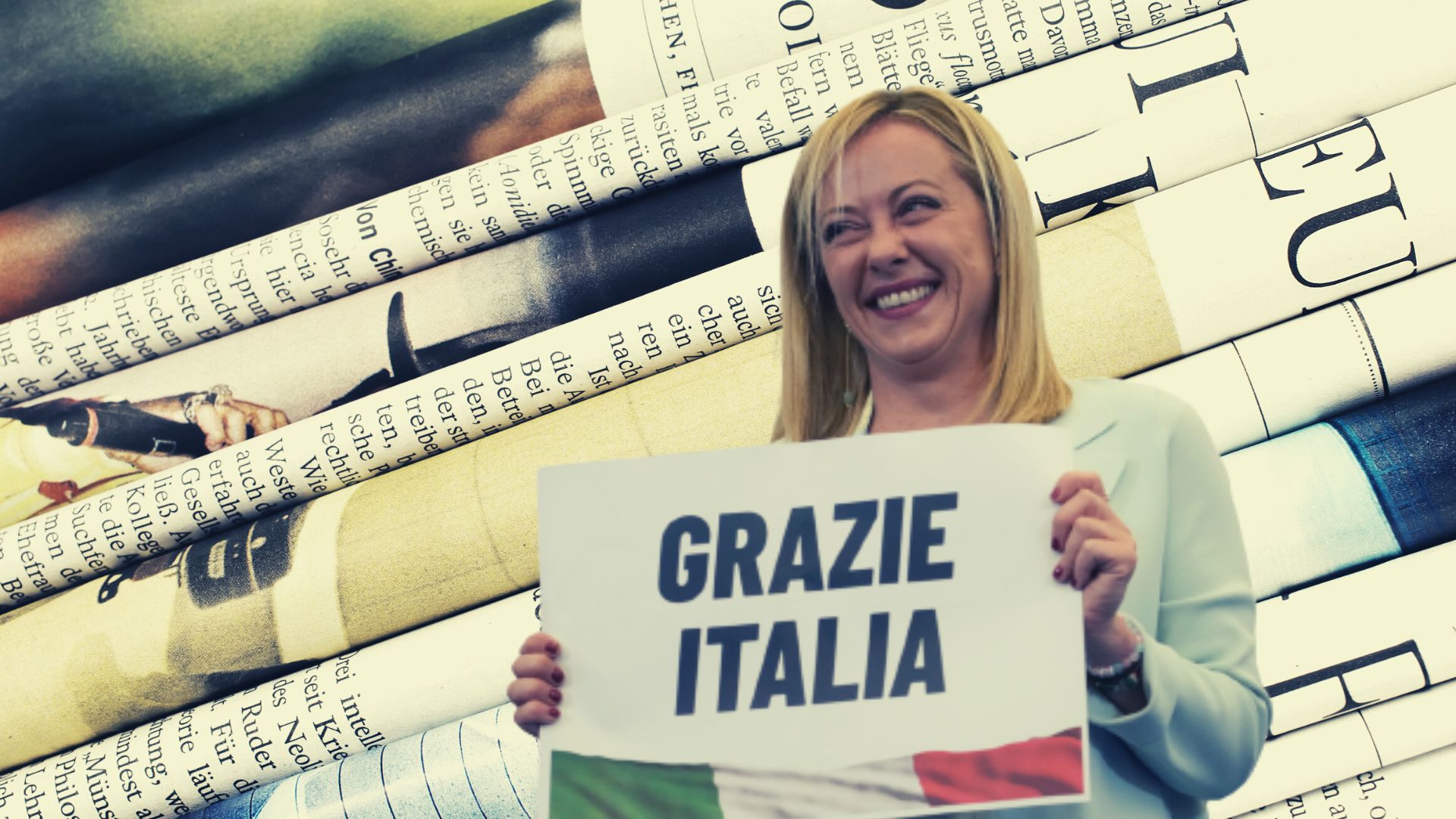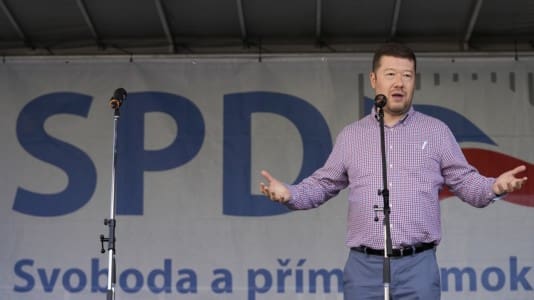Italy’s election results were the main topic for many newspapers across the continent on Monday morning. Those on the left — by far the most numerous — sometimes bordered on hysteria, while those on the right — quite rare in Western Europe outside the sphere of alternative media — were delighted.
In France, Italy’s neighboring country where the mainstream media are particularly worried about the victory of the friends of Marine Le Pen, but also of Hungary’s Viktor Orbán and Poland’s PiS, it was the left-wing daily Libération that was the most hysterical the day after Giorgia Meloni’s victory.
Why is Giorgia Meloni labelled “post-fascist” by the Left?
Like many left-wing media in Europe, Libération describes Giorgia Meloni as a “post-fascist,” which is due to her political beginnings in the MSI, the Italian Social Movement, a neo-fascist social movement created by former fascists after the war (in 1946). It aimed to gather non-communist workers under its banner, and when Meloni entered politics aged 15 in 1992, it was no longer neo-fascist but more of a broad national-conservative political movement with many different tendencies. Representatives of the MSI were ministers in the government of Silvio Berlusconi in 1994, and Meloni herself was minister for youth from 2008 to 2011 in the fourth Berlusconi government. Since 2020, she has chaired the European Conservatives and Reformists group (which includes the Polish PiS and the Spanish liberal-conservative party Vox).
And so Giorgia Meloni, born in 1977, has no connection with fascism and has never identified herself with this ideology, while the center-left Partito Democratico (PD) has many proud former members of the Communist Party in its ranks.
France
Despite Meloni not having any connection to fascism, this does not prevent Libération from publishing the headline: “In Italy: with Giorgia Meloni, post-fascism in power.” The article published under this headline ends with the sentence: “The opposition, for its part, fears that Giorgia Meloni will lead the country down the path of illiberal democracies, following the example of Jaroslaw Kaczynski’s Poland or Viktor Orbán’s Hungary.”
An interview published on the same day by Libération bears the title: “General elections: ‘Italy has never really come to terms with its fascist past’.”
[pp id=49966]
And Libération’s main correspondent writes that: “For the first time, one of the founding countries of the European Union will be governed by the far right. And it is not just any country, but one of the ‘big three’: Italy. The political shock is huge, since the construction of the European Union was launched in the aftermath of a world war for which the German and Italian fascists were responsible, in order to anchor democracy and put an end to narrow-minded nationalism and the conflicts it provoked. The probable appointment of Giorgia Meloni, the chairwoman of Fratelli d’Italia (FDI), an avowed post-fascist, therefore undermines the Union’s raison d’être.”
Unsurprisingly, the title of Jean Quatremer’s report refers to fascism too, as it reads: “Post-fascist Italy, a threat to European values.”
Meanwhile, the main title on left-wing Le Monde Monday morning was: “Elections in Italy: Giorgia Meloni and her post-fascist party Fratelli d’Italia win big,” with another article titled: “Elections in Italy: who is Giorgia Meloni, the young leader of the post-fascist party at the doors of power?”
Even on the website of France’s supposedly center-right daily Le Figaro ,the word “post-fascist” dominated on Monday Morning.
In a piece published by Le Figaro’s correspondent in Rome, whose title “Giorgia Meloni, a strong-willed woman who is widely supported in Italy” might let us think that Meloni and her party, which the paper labeled “national-conservative” instead of “post-fascist,” might be shown in a more positive light. However, the following excerpt shows this is far from reality:
“Her efforts to convince people that Fratelli d’Italia is a conservative party like any other cannot mask the fact that it is led by veterans of the Italian Social Movement (MSI), whose raison d’être, when it was created in 1946 on the ruins of fascism, was precisely to keep the flame alive. (…) the violence of her past accusations against ‘mass immigration,’ ‘gender ideology,’ the ‘Brussels bureaucrats’ or ‘big international finance’ is also troubling.”
Spain
The main title on Spain’s El País’ website on Monday morning was: “The far right wins elections in Italy for the first time.”
“The coalition of conservatives, post-fascists and populists, led by Giorgia Meloni, wins 44% of the votes in both the Chamber of Deputies and the Senate, with 97% of the votes counted,” El País wrote in an article.
[pp id=46537]
“A political earthquake with the scent of a far-right consolidation in Europe shook Italy on Sunday,” writes El País, noting that: “Italians have voted decisively for the coalition of the right and the far-right — a political conglomerate that had not governed since Silvio Berlusconi’s last government, fallen in 2011 when Italy was on the verge of bankruptcy and Meloni was a precocious Minister of Youth.”
Meanwhile, center-right El Mundo’s main headline on Monday morning was: “Meloni’s hard right wins in Italy and shakes the European Union.” This article starts with the following words: “The right-wing has won the Italian elections and is poised to return to power after a decade. The vote, with a record abstention rate, has also opened the door for the hard right, that of Giorgia Meloni, to reach Palazzo Chigi for the first time in history, closing forever an era, the one that the Republic inaugurated on the pillar of anti-fascism with the ashes of the Second World War still smoldering.”
Germany
Germany’s Frankfurter Algemeine Zeitung (FAZ) did not make any reference to fascism in its main article on Meloni’s victory on Monday morning, choosing instead to stress how much Europe’s right-wing parties were rejoicing at the election results in Italy. It quotes political leaders from the German Alternative for Germany (AfD), the French National Rally (RN), and also Polish Prime Minister Mateusz Morawiecki, and, as a counterweight, German SPD Vice-President of the European Parliament Katharina Barley (the one who wanted to “financially starve” Poland and Hungary):
“Giorgia Meloni will be a prime minister whose political role models are Viktor Orbán and Donald Trump. The election victory of the alliance of right-center parties in Italy is therefore worrying, (…) Meloni’s ‘campaign of paying lip service for Europe’ cannot hide the fact that she poses a threat to constructive coexistence in Europe,” the paper writes.
Germany’s taxpayer-funded outlets also gave their take, with German public broadcaster Deutsche Welle (DW) writing: “Giorgia Meloni, leading a center-right coalition, is on track to become Italy’s first woman prime minister ever and its first far-right leader since Benito Mussolini.”
[pp id=49908]
Very much like France’s Le Figaro, DW seems to think Meloni’s stance against the LGBT lobby, mass immigration, and big international finance is a clear sign that she does have some links to fascism:
“Meloni’s Brothers of Italy party is in an alliance with the anti-migrant League party of Matteo Salvini, as well as the center-right Forza Italia led by former Prime Minister Silvio Berlusconi. Meloni campaigned on a motto of ‘God, country and family.’ The 45-year-old nationalist has downplayed her party’s post-fascist roots and sought to promote it as a mainstream conservative group. She has rejected accusations of being a fascist and increasingly toned down some of the more far-right rhetoric. However, in June, she railed against a so-called LGBT lobby, ‘mass immigration’ and ‘big international finance’.”
Poland
The Polish left-wing daily Gazeta Wyborcza enumerated on Monday the main wrongs of Meloni in their eyes (and in the eyes of the European Left):
“Meloni, like the leaders of the Law and Justice (PiS) party, Italy’s partner on the far right in the European Parliament, preaches the need to make the European Union a ‘Europe of nations,’ with the defense of the continent against non-European immigration and the defense of Christian identity being the means to achieve it. In an autobiography published a year ago, she charged that ‘the EU in its current form is an undefined identity in the hands of mysterious bureaucrats who would like to remove national identities.’ In her election campaign, she announced a return to the ‘traditional’ family model, a fight against the ‘LGTB lobby,’ and the education of young people through sports to address ‘youthful deviancy,’ among which she listed self-harm, bulimia, obesity and anorexia in addition to drugs, nicotine and gambling addictions. Women, meanwhile, were promised the right ‘not to have abortions.’ Fratelli d’Italia even criticized an episode of Peppa Pig for ‘promoting gender ideology’ in which one of the animals had two moms.”
Manwhile, the reactions from Polish government circles were reproduced on the conservative daily Gazeta Polska Codziennie’s Niezalezna.pl website, under the title: “Law and Justice politicians on Italian elections: ‘Great victory’, ‘Bravo Italy! Democracy has won!’.”






